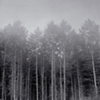Richard Skelton, "Landings"
 Richard Skelton has been quietly amassing a small but deeply devoted following for the last five years with a series of beautifully packaged self-released albums under a constantly changing series of guises (the best-known of which being A Broken Consort). With this, his second release for Type Records under his own name, he seems poised for much wider recognition as one of the most vital and singular artists in underground music. This is one of the most beautiful and essential albums that I’ve heard this year.
Richard Skelton has been quietly amassing a small but deeply devoted following for the last five years with a series of beautifully packaged self-released albums under a constantly changing series of guises (the best-known of which being A Broken Consort). With this, his second release for Type Records under his own name, he seems poised for much wider recognition as one of the most vital and singular artists in underground music. This is one of the most beautiful and essential albums that I’ve heard this year.
Richard Skelton occupies an unusual stylistic niche somewhere between classical music and drone, as Landings seems to be largely the product of unspecified bowed instruments and a looping pedal. I suppose Marielle Jakobsons’ Darwinsbitch project is something of a kindred spirit, though Skelton’s work is meditative and profoundly melancholy, whereas Jakobsons’ Ore is intense and harrowing. However, they both conjure almost supernaturally powerful, haunting, and enigmatic aural monoliths from mere wood, steel, and horsehair. Both are lucky that the witchcraze is a distant memory.
For the most part, Landings is built around achingly beautiful and impossibly sad beds of strings. That is not especially novel on its own, but no one else that I’ve heard has done it in such a visceral and vibrant way. The magic lies in the details, such as the squirming, shuddering bow-work in “Noon River Woods.” These 12 songs are all superficially gentle and hypnotically repeating, but they invariably crackle with creaks, bow scrapes, harmonics, echoes, moans, chirping birds, and all sorts of other evocative elements that are tangental to the central themes. The songs themselves, while gorgeous, seem to be merely a foundation for the mesmerizing, shimmering nimbus around them.
The album has a very timeless and organic feeling to it, which is likely a direct consequence of Skelton’s unusual recording techniques. The bulk of the material included here was improvised live over a period of four years in various remote locations throughout Northern England: on hillsides, along streams and rivers, in deep forests, etc. Moors, however, seem to be a particular favorite haunt: the now sold-out version of the album released through Skelton’s Sustain-Release imprint included a book of his writings on the West Pennine Moors of Lancashire, a place that has been of considerable import and inspiration for Richard in the past. Thankfully, he is not entirely a process purist, as the raw beauty captured during those excursions is later sculpted and augmented with overdubbing. As a result, many of the pieces manage to sound simultaneously alive and flowing, yet deliberate and artfully layered (no easy feat). At times I think the production might be a little cleaner than it should be, but I suspect that may be a necessity for capturing every single little nuance, which is an essential element of Skelton’s work.
Landings definitely sounds like the sort of album that takes four years to make: there is nothing weak or half-conceived here. While it might be his best work yet, it is by no means a dramatic leap forward, as the few other albums that I’ve heard exhibit much of the same ineffable sadness and focused intensity. There are several obvious standout moments, such as the echoing and lurching divinity of “Undertow” or the spectral pulsing of “Voice of the Book,” but Landings is one of those albums where my favorite song is destined to be in a constant state of flux. This is a thoroughly complex, visionary, and unique work. (The CD and MP3 versions of Landings on Type will not be released until 1/19/10, but the limited edition double LP is out now (with a bonus disc that I have not heard yet).
Samples:



